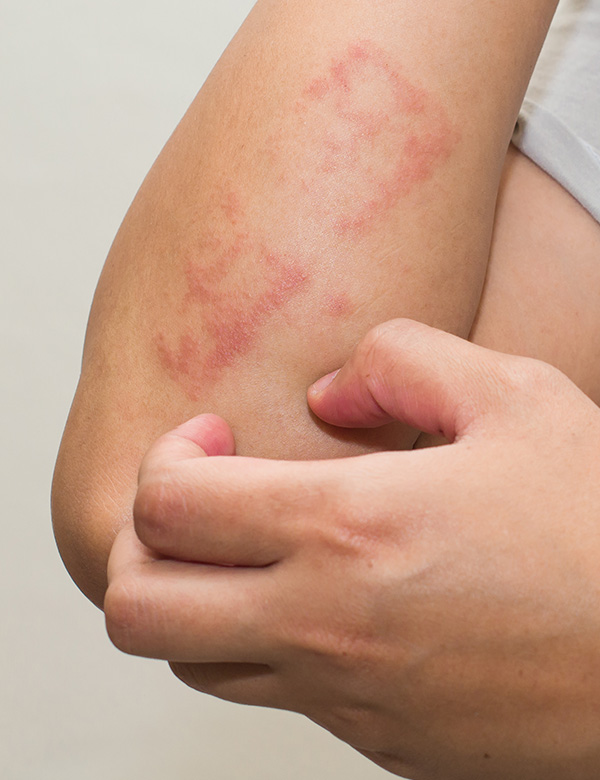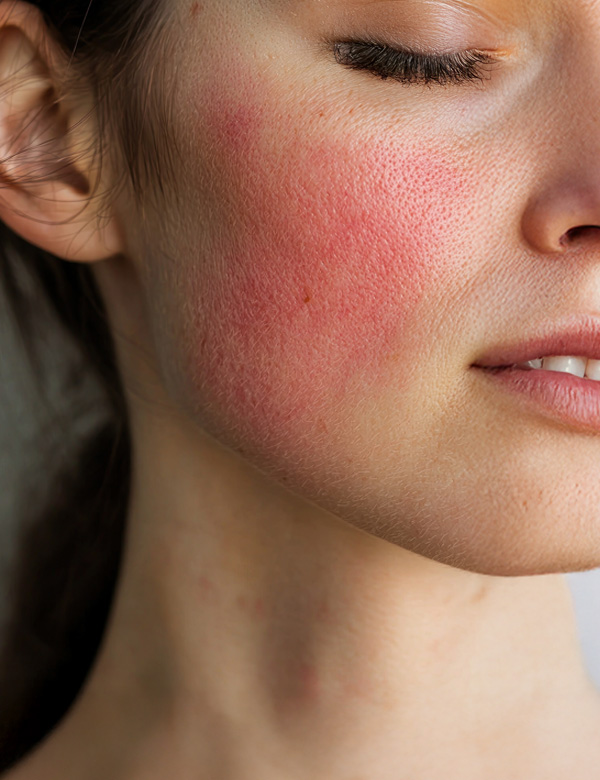Urticaria (Hives)
Recognize and treat hives (urticaria) – with an experienced dermatologist at Derma Medical Clinic in Zurich – Sihlcity
Urticaria (Hives)
Chronische Abszesse und schmerzhafte Knoten durch erfahrenen Hautarzt abklären und behandeln in der Derma Medical Clinic in Zürich - Sihlcity
Itchy welts, sudden skin rash or burning swellings – have hives assessed and treated as an inflammatory skin condition
Examinations
Specialist skin examination
Allergy tests if needed
Blood tests to identify possible triggers
For chronic urticaria: Rule out other conditions
Procedure
Initial consultation incl. skin check
Duration
approx. 20–30 minutes
What is hives?
Urticaria – commonly known as hives – is an autoimmune condition where the immune system mistakenly attacks the body’s own cells.
The skin changes look like those caused by contact with stinging nettles and can appear suddenly or last longer.
We differentiate between acute urticaria (lasting less than 6 weeks) and chronic urticaria (lasting more than 6 weeks). Sometimes a trigger can be identified, such as a medication, infection, or physical factors like cold, heat, or pressure. But in many cases, the cause remains unknown.
An assessment is recommended if you…
- notice sudden itchy welts or skin rash
- have recurring swellings on the lips, eyes, or hands
- feel itchiness at night or burning sensations on your skin
- suspect an allergic reaction but can’t identify a clear trigger
- have had symptoms of hives for weeks with no relief from medication
- want to find out whether you have chronic hives

What is hives?
Urticaria – commonly known as hives – is an autoimmune condition where the immune system mistakenly attacks the body’s own cells.
The skin changes look like those caused by contact with stinging nettles and can appear suddenly or last longer.
We differentiate between acute urticaria (lasting less than 6 weeks) and chronic urticaria (lasting more than 6 weeks). Sometimes a trigger can be identified, such as a medication, infection, or physical factors like cold, heat, or pressure. But in many cases, the cause remains unknown.
Who should get checked and treated for hives?
An assessment is recommended if you…
- notice sudden itchy welts or skin rash
- have recurring swellings on the lips, eyes, or hands
- feel itchiness at night or burning sensations on your skin
- suspect an allergic reaction but can’t identify a clear trigger
- have had symptoms of hives for weeks with no relief from medication
- want to find out whether you have chronic hives
Treatment
Diagnosis is based on a thorough skin examination by a specialist. In some cases, we may also do blood tests or allergy tests.
With chronic urticaria, further tests may be recommended to identify triggers or related health conditions.
What does the treatment for hives involve?
Most patients are treated with medication that reduces the allergic reaction (e.g. antihistamines). For severe or long-lasting cases, treatment with biologic medicines (biologics) – modern medications that target the inflammatory process – may be helpful.
We also offer advice on possible triggers and how to care for your skin in daily life.
What does the hives treatment process look like?
Initial consultation
We talk with you about your symptoms, medical history and possible triggers.
Skin examination
We carefully examine the affected skin and mucosal areas. If needed, blood tests or allergy tests will be done.
Treatment plan
We’ll review the results together and create a personalized treatment plan.
Long-term support
If you have chronic hives, we’ll provide ongoing care, with regular follow-ups and adjustments to your treatment as needed.

At Derma Medical Clinic, hives are treated only by experienced dermatologists:
- Dr. Benjamin Miller, board-certified dermatologist and phlebologist
- Dr. Markus Dendorfer, board-certified dermatologist and pediatric dermatology specialist
Both doctors have many years of experience in diagnosing and treating chronic inflammatory skin conditions.

Dr. med. Markus Dendorfer
Board-certified Specialist in Dermatology & Venereology FMH

Dr. med. Benjamin Miller
Board-certified Specialist in Dermatology & Venereology FMH
What to expect from us
Detailed assessment
We look at triggers, past health problems, and everyday factors together – even if lab tests seem normal.
Treatment based on condition
If standard medication is no longer effective, we offer modern treatment options like targeted inflammation blockers (biologics) or combination therapies.
Practical therapies
We help you manage your symptoms not only in the short term but also long term, with everyday strategies and clear check-up intervals.
Everything in one place
You’ll get diagnosis, medical treatment and cosmetic support all in one place. That means direct contact, short wait times and well-coordinated care from first consultation to follow-up visits.
Do you experience recurring rashes, welts or intense itching – with no clear cause?
Book an appointment now to check for hives at Derma Medical Clinic in Zurich – Sihlcity
FAQ – Frequently asked questions about hives
What is hives (urticaria)?
Hives – medically called urticaria – is a common skin condition where itchy welts or red patches appear suddenly on the skin. It happens because the immune system overreacts, causing special cells (mast cells) to release histamine. There are acute forms (lasting less than 6 weeks) and chronic forms (over 6 weeks).
What are the symptoms of hives?
Typical signs of urticaria include:
- Itchy, raised welts on the skin
- Redness, burning or warmth
- Swelling, especially on the face or lips (angioedema)
- Sudden onset, often without a clear cause
What can trigger hives?
Possible triggers include:
- Medications (e.g. painkillers)
- Certain foods or additives
- Infections
- Cold, heat, pressure or sunlight
- Stress
Often, no cause is found – especially in chronic urticaria.
Is hives contagious?
No – urticaria is not contagious. It is caused by a reaction of your own immune system and is not an infectious disease.
How is hives treated?
Treatment depends on the cause and how the condition develops. Common options include:
- Medications to reduce itching (antihistamines)
- Cortisone for more severe symptoms
- For chronic urticaria: modern treatments such as biologic medicines (e.g. omalizumab)
It’s also important to avoid known triggers where possible.
When should I see a doctor for hives?
If welts or swelling last for several days, keep coming back or interfere with daily life, you should get checked. If you experience breathing problems, swelling on the face or intense itching, see a doctor quickly.
How long does urticaria last?
Acute urticaria usually goes away after a few days or weeks. If symptoms last longer than six weeks, it’s considered chronic urticaria – often with ups and downs, and it may last for months or even years.
What helps with intense itching?
Antihistamines usually work well for itching. Cooling creams, loose clothing and avoiding rubbing or scratching also help. A gentle skincare routine can strengthen your skin barrier.




